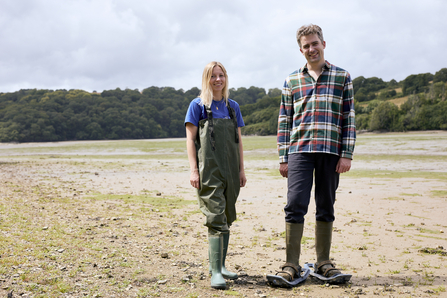
Sophie Pipe, Seagrass Officer at Cornwall Wildlife Trust and William Gee, Head of Sustainability at Seasalt

Sophie Pipe, Seagrass Officer at Cornwall Wildlife Trust and William Gee, Head of Sustainability at Seasalt
Seagrass planting trials in the Fal estuary have already produced incredible results – with seedlings growing in all three planting method trials.
This announcement comes on the one-year anniversary of the seagrass project launch, ‘Seeding Change Together,’ run by Cornwall Wildlife Trust and funded by Seasalt Cornwall.
Thanks to funding from Seasalt, who have donated £150,000 to the project as part of a three-year partnership, the ‘Seeding Change Together’ project is using technology never previously trialled in Cornwall before to study – and hopefully expand – the seagrass bed found at Cornwall Wildlife Trust’s Fal-Ruan nature reserve.

New growth of seagrass fronds in restoration area
Around 4,000 seeds were collected from stable and healthy meadows in the Fal Estuary at the end of last summer and planted in the mudflats to test a variety of methods aimed at identifying the most effective ways of restoring and growing seagrass. There are now seedlings growing in all three planting method trials.
Seagrass is a flowering marine plant that has the potential to capture carbon from the environment up to 35 times faster than tropical rainforests, making it a valuable resource in the fight against climate change. It also provides a habitat for marine life such as juvenile fish and seahorses, cleans surrounding seawater and helps to stabilise the seabed to protect the coast from erosion.
This celebration of the project’s success is being announced ahead of Cornwall Wildlife Trust’s National Marine Week, an action-packed period of events celebrating the incredible marine life along Cornwall’s coastline.

Cornwall Wildlife Trust Seagrass officer Sophie Pipe
Sophie Pipe, seagrass project officer at Cornwall Wildlife Trust, says:
“Over the past eight weeks, we have been expectantly checking on the planting trials in the hope that we will begin to see some seedlings emerge.
“I am really pleased to share we have seedlings growing in all three of our planting method trials (hessian bags planted after a seed rotting phase, hessian bags planted with seeds with no rotting phase, and the horizontal rhizome transplant method), which has gone beyond our hopes and expectations for our first year.
“These positive results give us a fantastic foundation to learn and build upon for our next season of planting trials. Due to this initial success, we intend to continue to expand on these current methods this year with the addition of two further methods for small scale restoration trials. It is early days, and the seedlings still have the challenge of surviving through what is projected to be another hot summer, but it is a fantastic start.
“In addition, we have recently found an additional seagrass meadow, further south in the Fal estuary, which has never been recorded or monitored before. We are already collecting data to learn about this new meadow with the intention of expanding trials to this site this year, as well as using the strongest parts of the meadow as additional donor material.
“Whilst early days, this is very exciting news, and we look forward to what the future holds.”

Checking the new shoots for seeds
Paul Hayes, CEO at Seasalt Cornwall, says:
“Congratulations to the team at Cornwall Wildlife Trust - it’s fantastic to reach such an exciting milestone in the planting trials.
“It is our ambition that the Seeding Change Together project becomes a vital case study in developing Seagrass ecosystems, opening the door for large-scale seagrass restoration across Cornwall and beyond. This is a giant leap forwards to reaching that goal and we’re thrilled to be supporting it.”

Snow shoes used as mud shoes to prevent damage to mud flats
The process of restoring the seagrass bed started in summer 2022. Baseline surveys were carried out in July, prior to any activity taking place, to assess the size and health of the seagrass meadows.
A small group of volunteers – including employees from Seasalt Cornwall – have contributed over 120 hours to the project by collecting and planting seeds. The team used bodyboards on the mud to hold their weight when moving around the site, helping to minimise disturbance to these delicate plants.
Newly purchased testing equipment, funded by Seasalt Cornwall, is helping scientists to understand how water quality is affecting the seagrass populations on-site. It is believed to be the first time these tests have been carried out at this location.
Marine biologists from Cornwall Wildlife Trust have tested a variety of methods aimed at identifying the most effective ways of restoring and growing seagrass. This includes placing seed mixtures into biodegradable hessian bags which are planted into the mudflats, as well as using cuttings of seagrass as an alternative to seed collection.

Quadrat survey
Cornwall Wildlife Trust’s Fal-Ruan nature reserve is home to dwarf eelgrass, one of two species of seagrass found in Cornish waters.
In the UK, approximately 92 percent of seagrass was lost in the last century. The huge decline has been caused by pollution, disease, and coastal development. Additionally, damage from anchoring, moorings and dredging has impacted the country’s seagrass beds.
If success continues, Cornwall Wildlife Trust hopes the project could lead to large-scale restoration and planting of seagrass in Cornwall’s estuaries.
Cornwall Wildlife Trust is inviting the public to celebrate this and its other marine achievements during National Marine Week: a nationwide celebration of the UK’s seas.
From 29th July to 6th August in Cornwall, you can get involved in various events with marine and coastal enthusiasts around the county. Join rockpool ramblers, seagrass snorkelers, and cliff-top dolphin watchers to learn about the extraordinary marine life along Cornwall’s coastline.